12 Powerful Hand Symbols (And The Meaning Of Each)
A simple hand gesture can change everything.
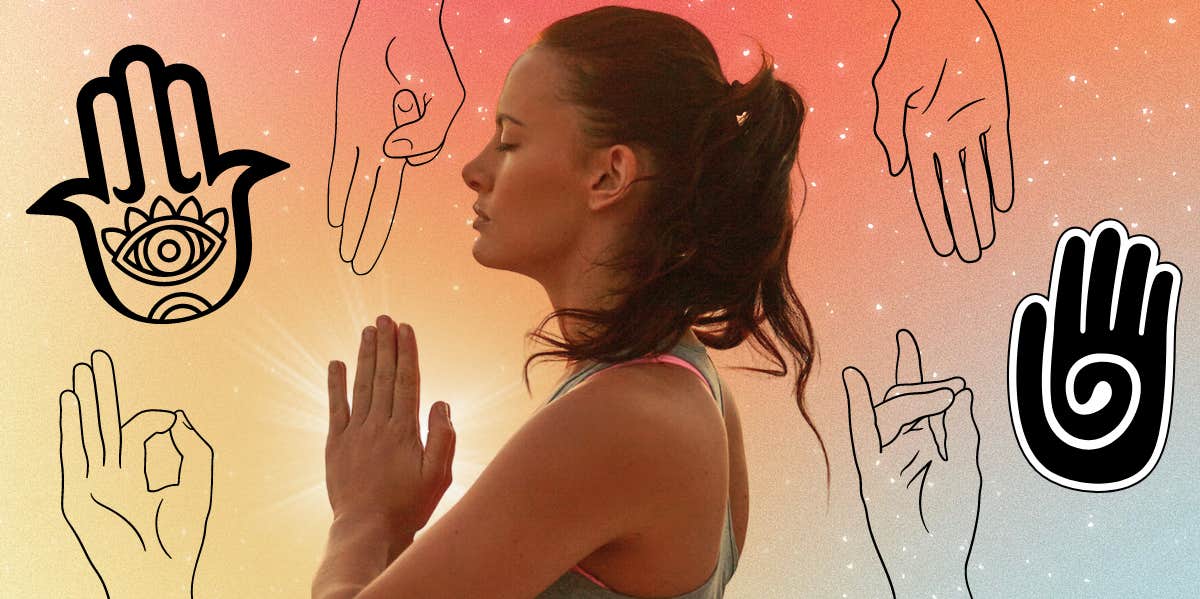 laflor / Getty Images, Dstudio, amethyststudio, Deadframe Works, Vital Intent via Canva
laflor / Getty Images, Dstudio, amethyststudio, Deadframe Works, Vital Intent via Canva You hold a lot of power in your hand, and the way you use them is directly tied to energy centers withing the body.
That is why hand symbols are used in a number of spiritual practices. Those hand positions are intended to correlate with various parts of the human body.
What do hands symbolize?
Hands are your primary way of feeling your way around the world. Non-verbal cues like a simple hand gesture can recharge and focus your energy.
Across cultures, hand symbolism is rich and varied. But most agree that what you do with your hands can have a great impact on mind, body, and spirit.
American Indian culture associates the hand with the Great Spirit. They used hand gestures and sign language to overcome communication barriers between Indian nations.
In Buddhism, the hand is a symbol of protection, while Celtic people relate it to the rays of the sun. Chinese culture believes the hand is representative of longevity.
In Christianity, the hand of blessing represents The Father, The Son, and The Holy Spirit. Similarly, in Greek culture, a prominent hand symbol, the Hand of Sabazios, symbolizes the helping hand of God, protection, and healing.
12 Spiritual Hand Symbols
There are too many hand symbols in the world to count, but there are several that are frequently used and have deep spiritual meaning. Here, we will list just 12 spiritual hand symbols, including nine that come from mediation practices called "mudras" to get into a certain state of mind. The last three appear in several modern religions and Native American culture.
Mudra means "seal" or "mark" in Sanskrit. The associated symbols have been used in Buddhist and Hindu culture forever as part of their ceremonial and religious practices. Mudras are secular so they aren’t attached to religion but are closely associated with spirituality, meditation, yoga, and breathing.
There are five categories of mudras: Yogic, customary, spiritual, curative, and religious. Based on the ancient Indian healing system, Ayurveda, mudra’s premise is that our bodies are made of five elements: Agni (fire), Vayu (air), Aakash (space), Pruthvi (earth), and Jal (water).
Your mudra hand represents these elements, with the thumb meaning fire, the index finger meaning air, middle fingers tied to space (the sky), the ring finger representing earth, and the pinky finger linked to water. Using each in the right balance can prevent illness and disease, and help with your emotional well-being.
1. The Gyan Mudra (Knowledge)
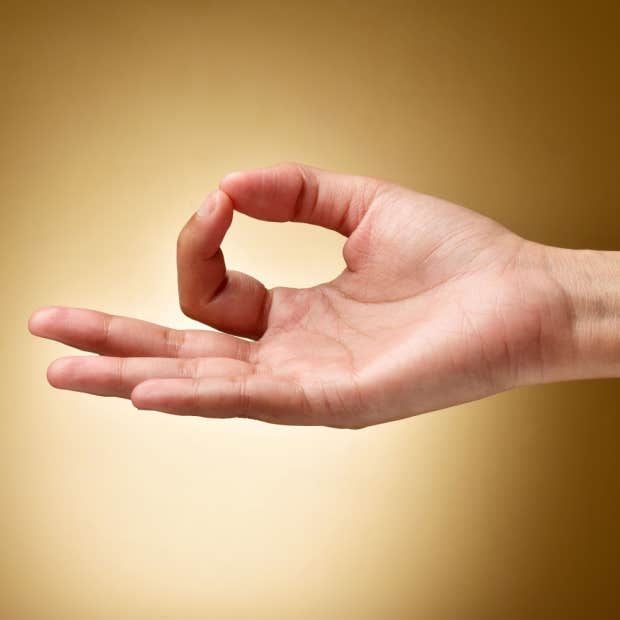 Photo: Funstock / Shutterstock
Photo: Funstock / Shutterstock
This symbol is done by touching the tip of your thumb with the index fingertip and holding the other three fingers straight, palm facing upward. It is one of the most popular mudras.
The Gyan helps with insight, concentration, knowledge-building, and memory. It can also reduce stress and improve focus.
2. Abhaya Mudra (Fearlessness)
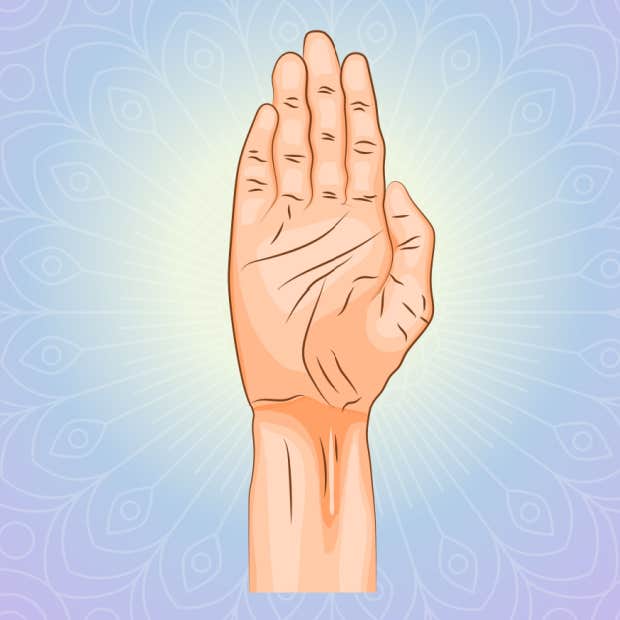 Photo: Valentina Kalashnikova / Shutterstock
Photo: Valentina Kalashnikova / Shutterstock
You may recall seeing this hand gesture on Thai and Burmese Buddha statues. The hand is upheld as if saying "hello" or "stop." It rids you of fear and protects you from negative energy. This hand position is intended to bring you peace, calm, and reassurance.
3. Apana Mudra (Detoxification)
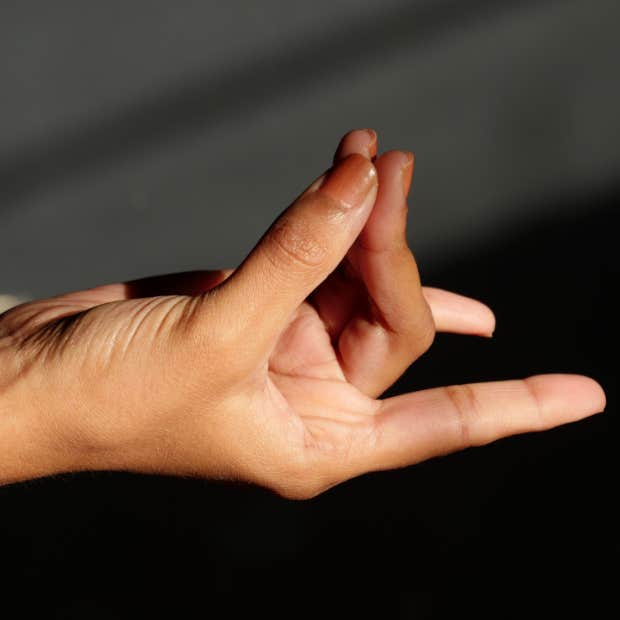 Photo: kriyopics / Shutterstock
Photo: kriyopics / Shutterstock
The Apana Mudra uses both hands with the tips of the middle and ring fingers touching the thumb tip, while the index and small finger point upward. Its purpose is to strengthen your heart and improve the flow of your detoxification system, which includes your sweat, stool, and urine.
4. Vitarka Mudra (Teaching)
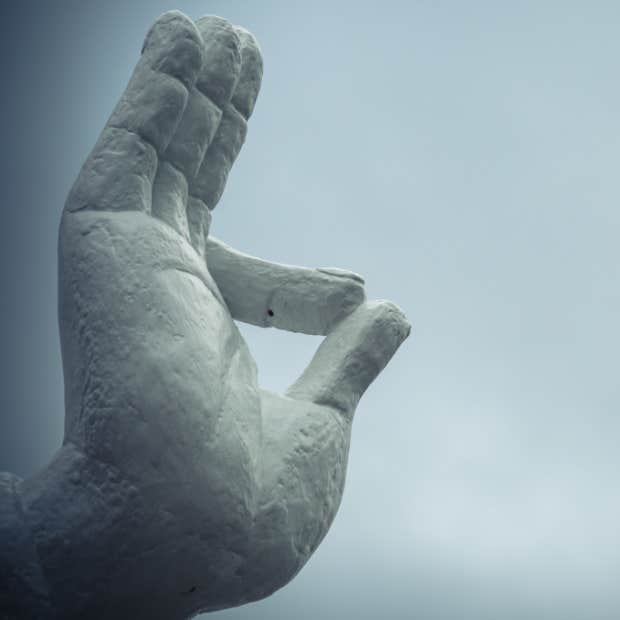 Photo: Trong Nguyen / Shutterstock
Photo: Trong Nguyen / Shutterstock
The Vitarka pose is just like the Gyan with the thumb touching the index fingertip ,while the other three fingers stand up. The only difference is that the palm is facing forward instead of upward.
The index finger and thumb create a circle signifying the wheel of teaching, so this symbol promotes personal growth, learning, and development.
5. Buddhi Mudra (Perception)
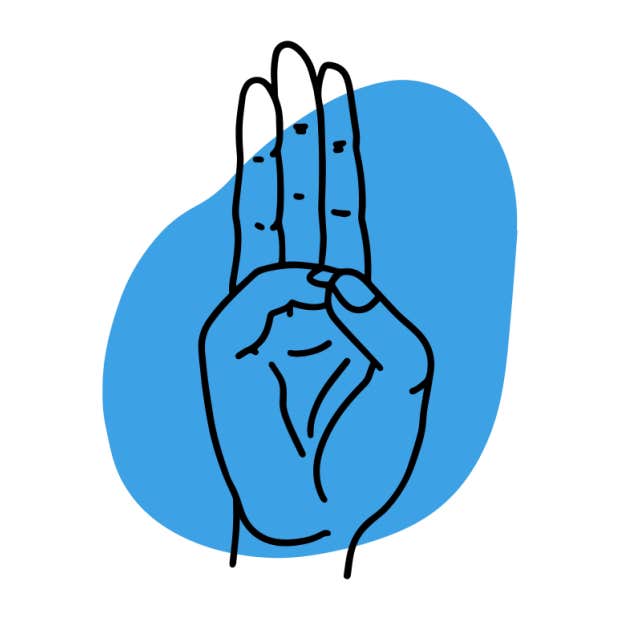 Photo: D things / Shutterstock
Photo: D things / Shutterstock
Buddhi translates to "intellect" or "perception" in Sanskrit. This mudra sign is done by bringing the pinky finger and thumb together at the tips and pressing lightly to "seal" them. The middle, ring, and index fingers are pointed outward.
The Buddhi Mudra enhances your spiritual connection, makes your thoughts flow freely, and takes you to a higher level of consciousness.
6. Anjali Mudra (Namaskara/Namaste)
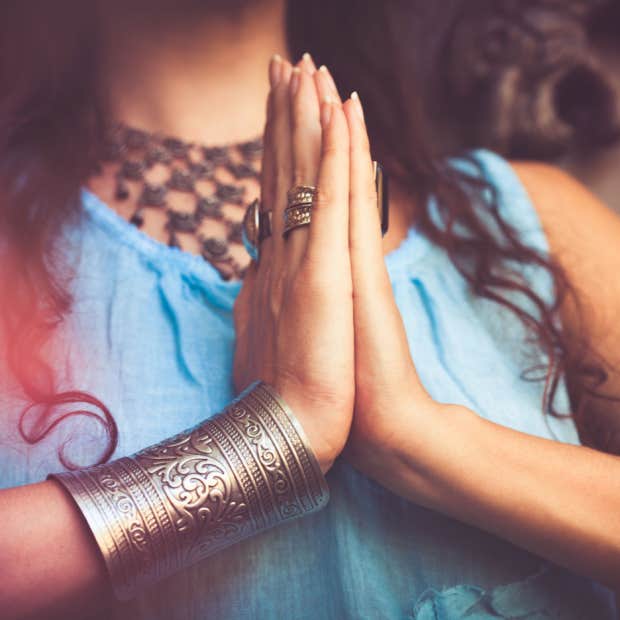 Photo: coka / Shutterstock
Photo: coka / Shutterstock
The Anjali Mudra is also known as "Namaste" or "Namaskara." You probably recognize it from yoga and meditation. You simply bring your palms together near the heart chakra. The ends of the pinky fingers and thumbs must touch.
It promotes mutual respect for others, love and compassion, hence the reason it is used in Asian cultures when bowing.
7. Dhyana Mudra (Enlightenment)
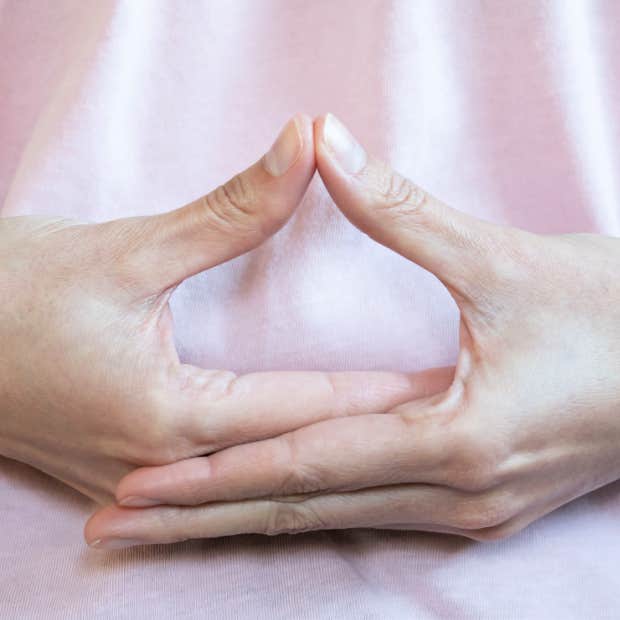 Photo: Julia Rios Gomez / Shutterstock
Photo: Julia Rios Gomez / Shutterstock
To do this hand position, the right hand is cradled in the left hand, resting on your lap, and the palms face upward. Both thumbs are arched and touching to form a triangle at the base (sacral) chakra.
This powerful pose symbolizes grounding and an awakening of your consciousness.
8. Bhumisparsha Mudra (Earth Touching)
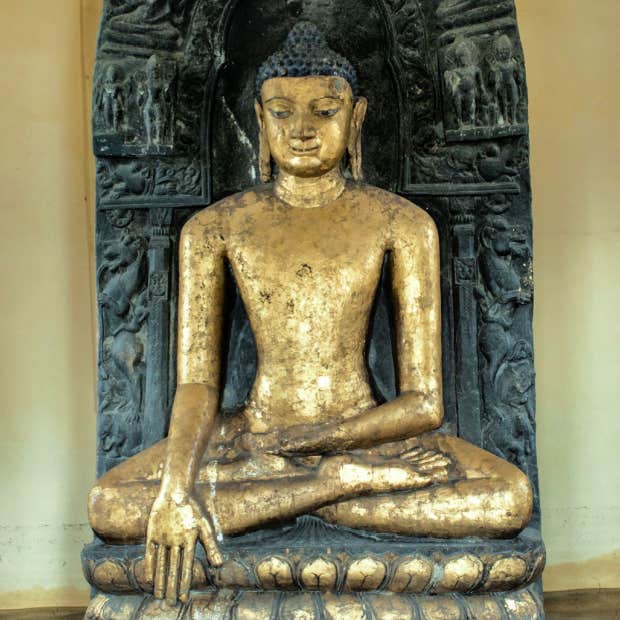 Photo: AnilD / Shutterstock
Photo: AnilD / Shutterstock
This hand symbol comes from the meditating Buddha. The hand rests pointing downward, appearing to touch the soil. Touching the earth represents enlightenment and spiritual awakening.
9. Vayu Mudra (Flowing Air)
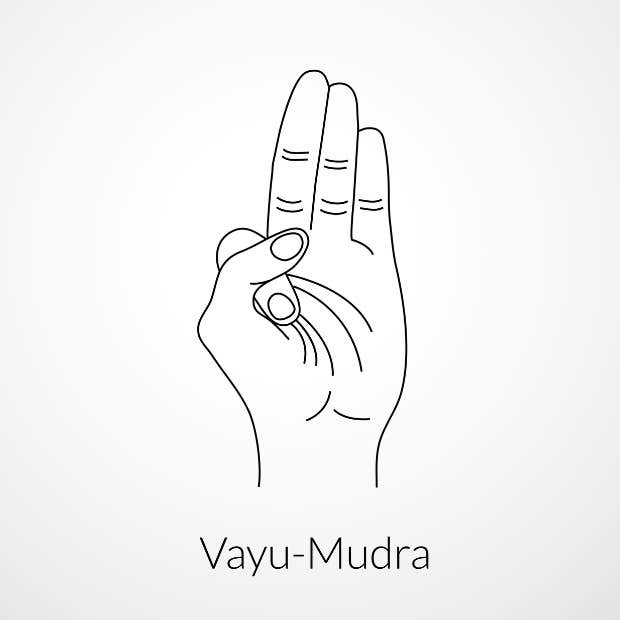 Photo: Buddy Cat / Shutterstock
Photo: Buddy Cat / Shutterstock
The Vayu is done by holding your hand up, facing forward, and pinning the tip of the index finger under the pad of the thumb, while the other three fingers remain erect and upright. This hand gesture regulates air in the body, relieving pain, supporting skin health, and reducing stress and anxiety.
10. Hand of Hamsa
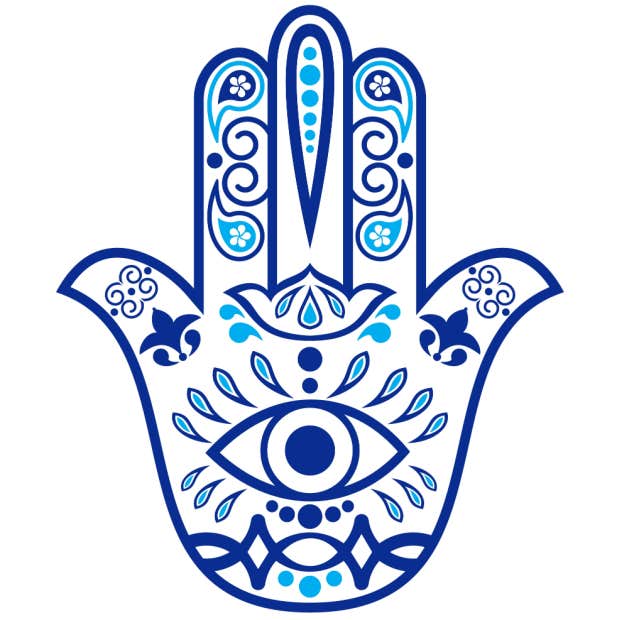 Photo: Tatiana Shepeleva / Shutterstock
Photo: Tatiana Shepeleva / Shutterstock
The Hand of Hamsa, also known as the Hand of Fatima, originated in Islam. As the story goes, Fatima, Mohammed’s daughter, found out her husband had married another woman and was so distraught, she stirred a pot with her bare hand. So, it came to represent the importance of being faithful.
Since then, it has been adapted by many religions around the world and the meanings vary. But when the hand is up, it protects the wearer against anything that would harm them, including the evil eye.
11. Inverted Hamsa
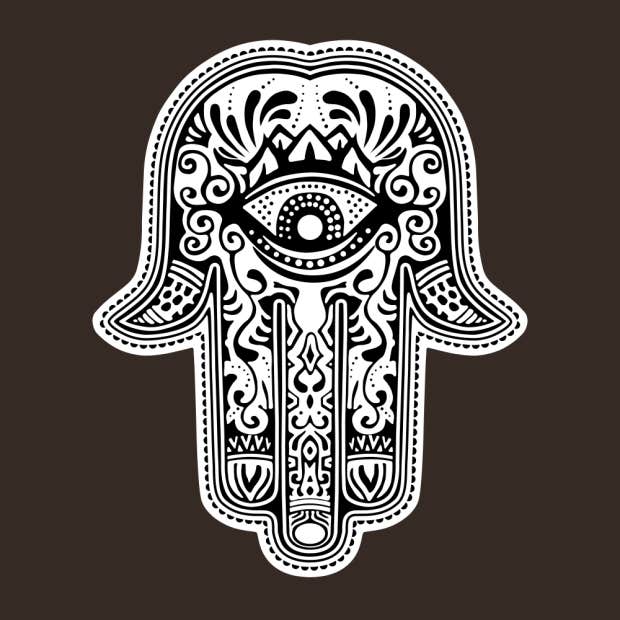 Photo: Blazena Kamasova / Shutterstock
Photo: Blazena Kamasova / Shutterstock
When the Hand of Hamsa is turned upside down, it represents abundance and prosperity. It is a sign that you welcome the good in life. You might find it worn on necklaces or on bracelets to usher in positivity.
12. Hopi Hand
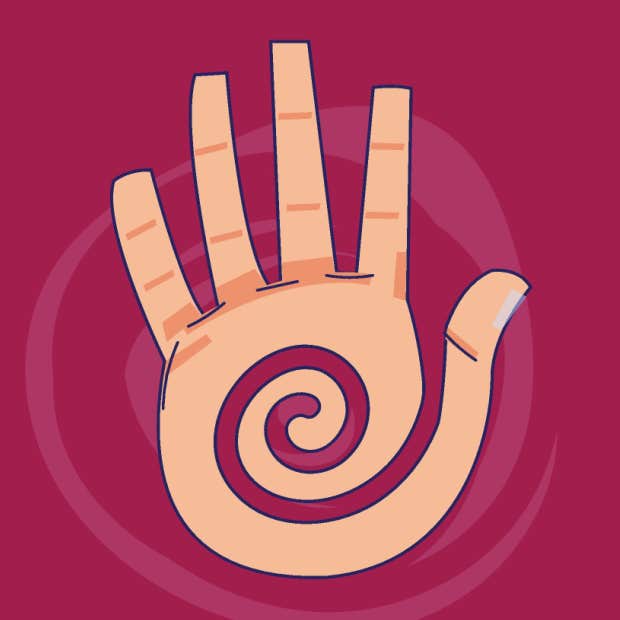 Photo: angkrit / Shutterstock
Photo: angkrit / Shutterstock
The Hopi Hand originated from the Native American tribes and looks like a hand telling you "hello" or "stop." There is a spiral in the palm, and it is believed to send out healing vibrations into the world around you. The spiraled palm represents the universe.
NyRee Ausler is a writer from Seattle, Washington, and the author of seven books. She covers lifestyle, entertainment and news, and self-focused content, as well as navigating the workplace and social issues.

